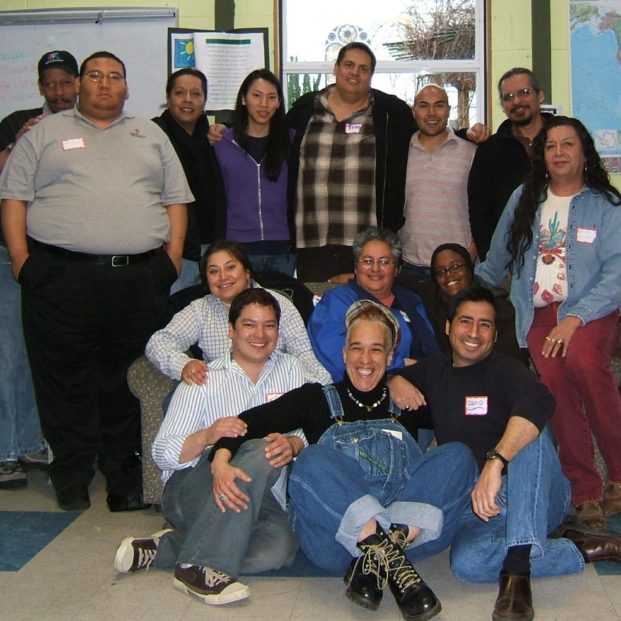Several years ago, Pride Foundation observed that organizations serving LGBTQ persons of color often lacked the financial and organizational support needed to be a permanent and visible part of our community.
In recognition of this fact, in 2007 Pride Foundation applied to and received grant funding from Funders for LGBTQ Issues [LINK: http://www.lgbtfunders.org/] to fund the Racial Equity Initiative (REI), a multi-year project with the goal of providing organizations serving LGBTQ persons of color with the tools and resources needed to foster success and growth in the communities they served.
The Racial Equity Initiative also presented an opportunity for Pride Foundation to deepen our understanding of issues faced by LGBTQ people of color communities, raise awareness across the broader community regarding the hopes and concerns for queer people of color, increase funding to these organizations, and be more deliberate and creative in our support of constituent organizations. We also felt confident that receiving this grant would change how we think about and do our grantmaking.
Formally launched in 2008, REI consisted of three core components: developing a cohort; training and capacity building; and strategic funding. Pride Foundation worked closely with staff members of each organization to make sure participation in REI met the group’s wishes with respect to its size, mission, organizational makeup, and location.
Seven organizations, each distinct in the constituencies and regions they served, participated in the REI:
- Umatilla Morrow Alternatives [LINK: http://www.umalt.com/]
- Portland Latino Gay Pride [LINK: http://www.latinogaypridepdx.com/]
- Entre Hermanos [LINK: http://www.entrehermanos.org/]
- Asian Pacific Islander Pride [LINK: http://www.api-pride.blogspot.com/]
- Trikone Northwest [LINK: http://www.trikonenw.org/]
- Voices Rising [LINK: http://www.voicesrisingseattle.org/]
- The Montana Two Spirit Society [LINK: http://www.mttwospirit.org/]
Starting in Jan. 2008, the cohort joined together for a series of quarterly in-person and phone conferences designed to:
- Strengthen a regional network of LGBTQ people-of-color leaders;
- Provide a space for organizational leaders to have peer support and learning around issues related to the work they are doing; and
- Begin strategic conversations with LGBTQ people of color organizing in the Northwest toward building a broad base of support and political power for the work they are doing.
In addition to facilitating the cohort meetings, Pride Foundation also worked individually with each group to assess its strengths and prioritize areas of improvement in all aspects of the organization, including leadership, management, fundraising, and other technical skills. Based on those findings, the foundation made technical assistance funds available with the goal of strengthening the internal capacity of participating organizations. Additionally, joint training opportunities were developed where appropriate and facilitated at cohort gatherings.
In 2010, Pride Foundation developed a technical assistance site [link to site] that offered a collection of online resources and free or low-cost training options. Based on the cohort’s discussions and identification of challenges, the site focused on these four areas: financial management, leadership development, fund development, and board development.
During each year of the program, Pride Foundation also made REI grants in the amount of $10,000 available to participating groups. Cohort organizations decided early on to pool the resources in order to ensure each group received the same amount. Then, as part of this effort, Pride Foundation instituted an application process where, with assistance from foundation staff members, groups applied for funds each year. For several cohort groups, this was a significant capacity-building activity, and the result was a greater knowledge of how to create proposals, as well as the development of template materials that could be re-used in other applications.
After the initial meeting, held five years earlier, the REI cohort came together as a group for the last time in Jan. 2013. During the closing meeting, the group reflected on the changes they experienced as part of their journey as part of REI—both as a cohort and as individual organizations.
Some of these changes, as reported by cohort members, included creating a stronger and expanded board of directors and volunteer base; developing a clear organizational vision and mission; increased visibility and collaboration with like-minded groups; and a greater capacity to fundraise and apply for future grants. Of all the lessons learned, perhaps the most significant was to have hope, to persevere, to affirm the value of the groups’ work, and to know that they “are not alone.”
The organizations that participated in the initiative provide unique opportunities for the LGBTQ community in their regions and for LGBTQ leaders of color to grow, learn, and be engaged in ways not seen before. These leaders are an inspiration for the creative way they do their work with modest financial and organizational resources.
For Pride Foundation, the Racial Equity Initiative reaffirmed the importance of supporting the vision and ideas of LGBTQ leaders of color. When we applied for the grant, we felt it was very important that we not view this as a project with a beginning and an end, but an ongoing process influencing our work. One of our goals was to have the learning from this initiative have a permanent effect on our grantmaking and our own organizational leadership. Today, Pride Foundation remains committed to ensuring this vital part of our community continues to grow its reach and deepen its impact.
Kris is Pride Foundation’s Executive Director. Email Kris.
